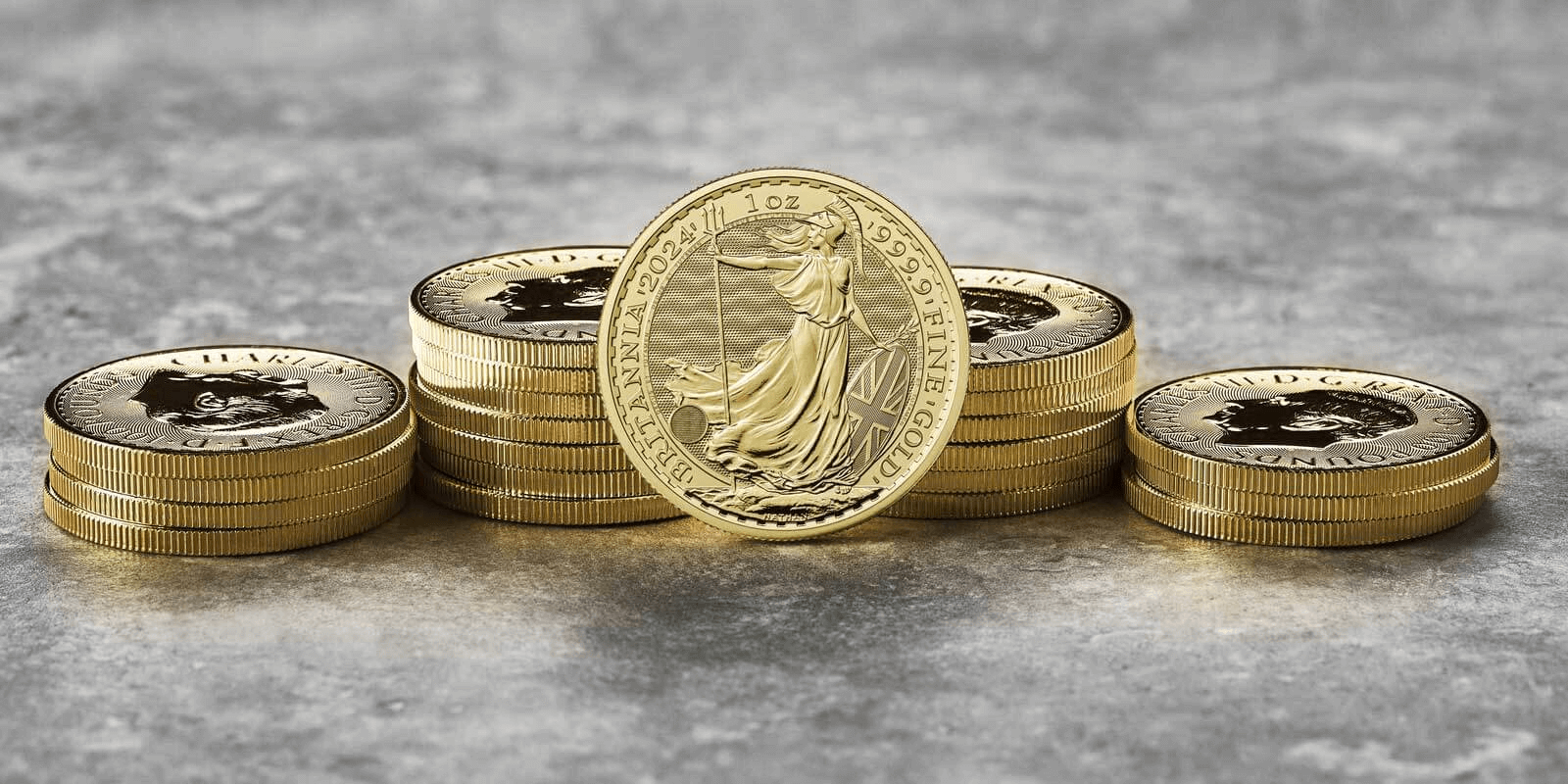
Gold’s role as a risk management tool within a well-diversified portfolio is frequently talked about. However, with the ever-changing policy landscape, some forms of gold investment also carry additional tax benefits.
In the realm of investment, gold has long been revered as a store of value and a hedge against economic uncertainties. For United Kingdom investors, the appeal of physical gold, including bullion bars, Sovereign coins and Britannia coins, goes beyond the inherent stability of the precious metal. The UK tax benefits associated with investing in physical gold make it a compelling choice for those seeking to diversify their portfolios whilst enjoying certain advantages in taxation.
Capital Gains Tax Advantages
Capital Gains Tax (CGT) has been a hot policy topic over the last year, with some major changes being implemented affecting investors, namely, the reduction in the CGT annual exemption for each tax year. This effectively reduces the amount an individual (or trust) can realise as a capital gain without being subject to CGT.
With the sequential reduction in CGT annual exemption, investors may look to explore others CGT-efficient assets, which could also provide further diversification benefits in uncertain economic times. One of the appeals of our bullion coins is that they are CGT exempt, due to their status as legal tender. They are also popular with investors across the world due to their timeless design, historical importance and enhanced security features.
What is Capital Gains Tax?
CGT is the tax you pay on the profit or gain that you’ve made on a taxable asset when it is sold. It applies to assets that you own, such as bullion, property or shares. CGT differs from Income Tax in that only the gain made on the sale of the asset is taxable. For example, if you bought a gold bar for £5,000 and sold it for £7,000, the CGT would apply to the £2,000 profit you made from the sale (excluding any trade costs). CGT is usually charged at a rate between 10–28%, depending on your tax band and the taxable asset in question. However, you don’t have to pay CGT if your total gains within a tax year fall below the CGT allowance of £6,000 (2023/24).* It is the responsibility of the individual investor to declare any CGT payable.
Gold Bullion Coins and Capital Gains Tax
Bullion coins from The Royal Mint are exempt from CGT for UK residents due to their status as legal British currency. In fact, all gold, silver and platinum bullion coins produced by The Royal Mint are classed as CGT-free investments; this includes gold and silver Britannia coins, Sovereigns and the popular Queen’s Beasts range. Due to their CGT exemption, investors can make an unlimited tax-free profit on all bullion coins produced by The Royal Mint. This contrasts with the vast majority of other investments and assets, including paintings, antiques, most shares and any property other than someone’s main residence, where the profits on the sale are liable for CGT.
Does the Gold Price Impact This?
Of course, someone could be selling gold bullion acquired many years earlier when the price was much lower, making it more likely that they would be exposed to CGT. This likelihood would be increased further if the sale of other assets, such as a second home or a valuable painting, had used up much or all of the exemption. In that event, a CGT liability may arise depending on the person’s taxable gains in any single tax year.
However, it’s important to remember that should someone be liable to CGT, losses on the sale of other taxable assets can be set against gains before the final calculation is made.
What is Value Added Tax (VAT)?
VAT is the tax you pay on something you buy, which usually adds 20% to the price, although there is also a 5% and 0% VAT rate.
All gold bullion sold by The Royal Mint, including The Sovereign and Britannia ranges, is VAT free for non-VAT registered private individuals. However, silver and platinum bullion, regardless of the country of issue, is subject to VAT at the current rate of 20%.
Why is VAT not Charged on Gold Anymore?
Before 1 January 2000, gold sales in the UK were subject to VAT. This changed because of the disparity between rules in the European Union. For example, some countries in the EU did not charge VAT on gold at all or charged it at a very low rate, which meant that the UK was at a disadvantage compared with other EU member states. The introduction of the exemption meant that for VAT purposes, investment gold would be treated the same as other investments, such as stocks and shares.

Inheritance tax (IHT)
IHT (estate tax) is a levy paid on the estate assets of a deceased person after deducting any liabilities, exemptions and reliefs..
The current IHT charge is 40% for estates worth more than £325,000, which is combined to £650,000 for a married couple. There is also a further allowance of £175,000 per spouse towards the bequest of the main residence, should the home be passed to children or grandchildren.
Gold has been traditionally recognised as a store of wealth. For individuals concerned about wealth preservation and inheritance tax planning, physical gold investments could play a strategic role. Although gold is subject to inheritance tax, it can be a valuable asset for passing on wealth to the next generation, and there are investment vehicles which can assist in this endeavour, namely pensions.
Pensions: Gold for Pensions
At The Royal Mint, we facilitate the purchase of gold bullion bars within SIPP- and SSAS-based pensions via our Gold for Pensions offering. We provide gold investment for both adult (bespoke) Self-Invested Personal Pension (SIPP) schemes and Junior SIPPs.
A Junior SIPP could provide an alternative means to create a nest egg for loved ones, whilst also providing a tax-efficient means of generational wealth transfer. Junior SIPPs allow for a parent or guardian to make gross contributions (grossed up to a maximum contribution of £3,600 for the 2023/24 tax year) into a SIPP, held in trust, for the benefit of their child. These are effectively gifts which would then fall outside of the parent/ guardian’s estate for the calculation of inheritance tax.
Start Early, Benefit More
A Junior SIPP is SIPP specifically designed for young people. Starting a Junior SIPP for a child or young family member can provide a head start in building a substantial retirement fund. The power of compounding works best when it has more time to grow, making early contributions invaluable for long-term wealth accumulation.
Tax Efficiency
Contributions to a Junior SIPP qualify for tax relief, just like standard pensions. The income and growth within a pension are free from Income Tax and CGT. This tax efficiency enhances the growth potential of the investment, as contributions receive a boost from the government in the form of tax relief. Investors making contributions into a Junior SIPP will also be reducing their estate assets, thus reducing the potential of a future inheritance tax liability.
Conclusion
Bullion coins, and gold bar investments within a pension, can afford UK investors additional tax efficiencies, particularly when considered as part of a well-diversified portfolio, where investors may also benefit from other tax efficient structures such as an ISA.
As always, when it comes to financial and wealth planning, particularly within in the context of tax and legal structures, it if often recommended to seek professional advice.
References
- Reforming inheritance tax | Institute for Fiscal Studies (ifs.org.uk)
- Capital Gains Tax rates and allowances - GOV.UK (www.gov.uk)
- Do you reclaim or reduce withholding tax on overseas dividends? | AJ Bell
- Tax on foreign income: Reporting your foreign income - GOV.UK (www.gov.uk)
The contents of this article, accurate at the time of publishing, are for general information purposes only, and do not constitute investment, pensions, legal, tax or any other advice. Before making any investment or financial decision, you may wish to seek advice from your financial, pensions, legal, tax and/or accounting advisors.
Tax Disclaimer
Please be advised that The Royal Mint are not tax advisers and any information provided on our website in connection with the tax status of products is provided for general information purposes only, and should not be relied upon; in particular, the underlying tax legislation is always subject to change. You should obtain any specific advice from your tax adviser.





